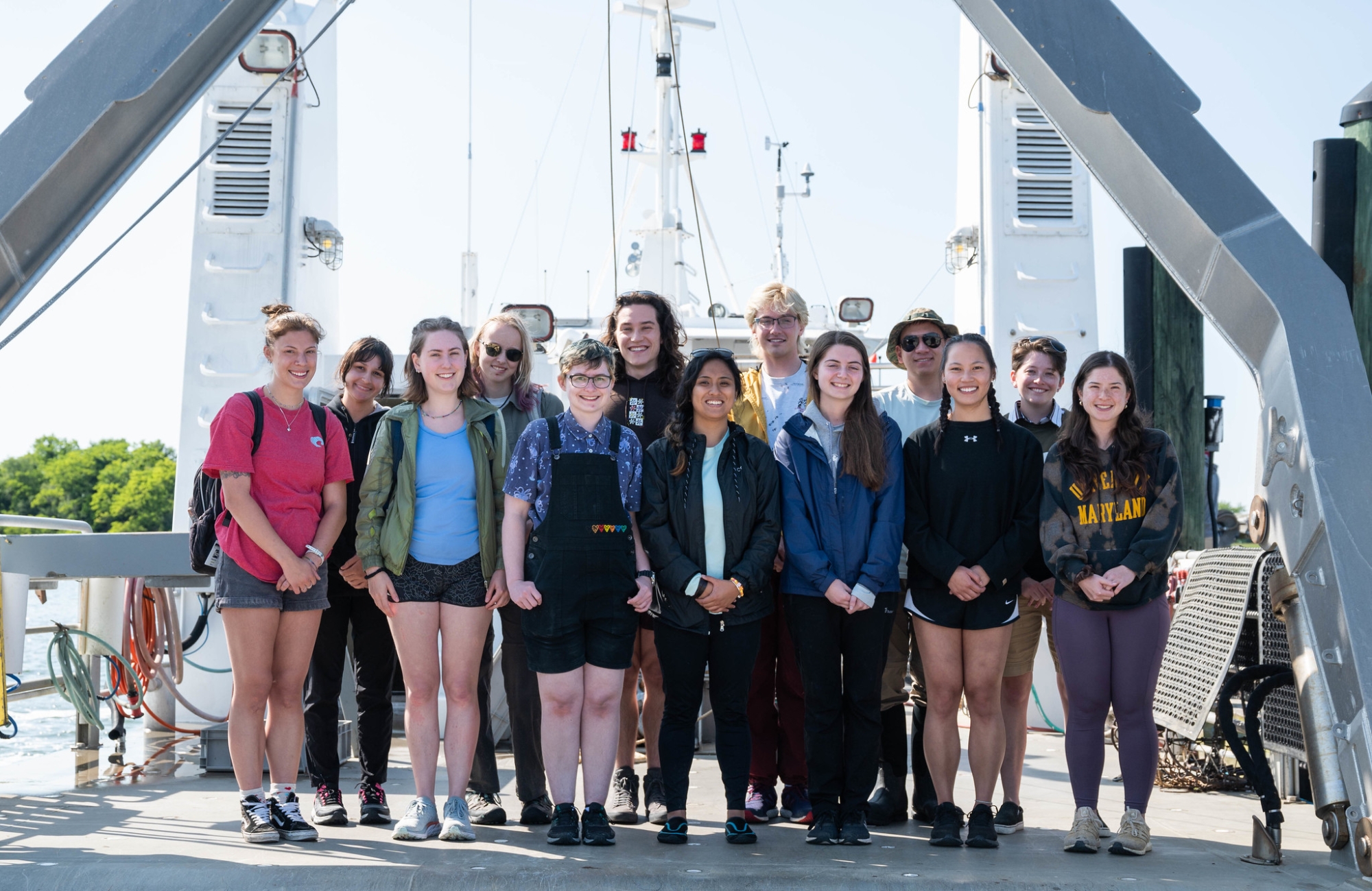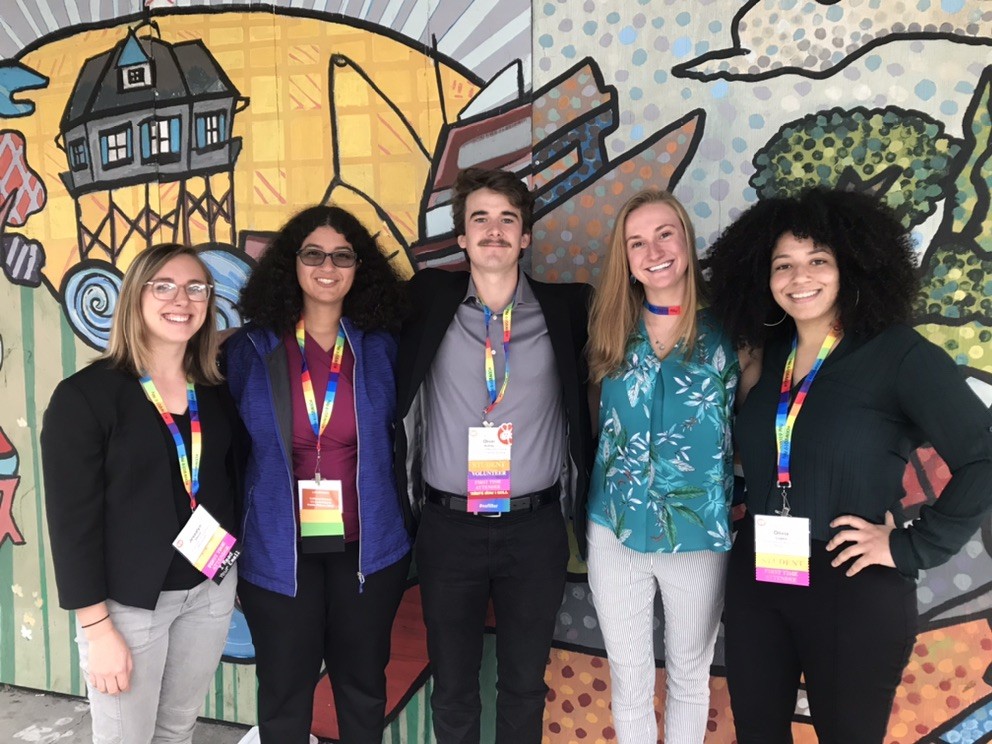Eight students will be presenting the summer work at the Ocean Sciences Meeting in March 2022!
Frequently Asked Questions

You asked, we'll try to answer. Here are answers to frequently asked questions about Maryland Sea Grant's Research Experiences for Undergraduates program.
Applying to the Program
I'm a sophomore. What are my chances of getting a fellowship?
Maryland Sea Grant looks to provide National Science Foundation (NSF) REU fellowships to rising college seniors. Students with five semesters of coursework are much better prepared for the summer REU research experience. We encourage sophomores to seek other research opportunities and apply when they are rising seniors or seniors graduating after the fellowship.
I live in the United States; however, I'm not a U.S. citizen. Am I still eligible?
NSF regulations require that all students receiving a fellowship with Maryland Sea Grant be U.S. citizens or permanent residents.
I'm a senior who is graduating in May before the fellowship begins. Am I eligible?
NSF regulations require all fellows to be current undergraduate students, so you would not be eligible to participate in the summer program. Fellows must graduate after the completion of the summer program.
I've already had an REU Fellowship. Can I still apply for your fellowship?
In general, NSF has a "no repeat" guideline. This means that a student who has already had an REU Fellowship will not be considered for another one. There are exceptions to this rule, and each decision will be evaluated on a case-by-case basis.
When might I expect to hear about a fellowship offer from Maryland Sea Grant and how much time do I have to decide?
Applications are due February 10th, 2025. Each year, students who are not selected in the first round of application review are notified in late March. Maryland Sea Grant sends out fellowship offers on or after March 15th. Students are typically notified in April regarding their final status. After you have been offered a Maryland Sea Grant REU Fellowship, you have up to five days to decide whether to accept it. If you have questions or concerns regarding your status, please contact Dr. Michael Allen or Chris Flight at reu@mdsg.umd.edu.
How do you select mentors?
Before applying, students are encouraged to look at the list of mentors who have worked with REU students. The list includes descriptions of research projects conducted by those students. Applicants should describe in their personal statements the particular areas or specific mentors that may match their interests. The selection committee matches students and mentors based primarily on their mutual interests.
If I am offered a fellowship and accept, what kind of workload can I expect? Will I have to work weekends?
You are expected to work at least 40 hours per week. You will be spending the summer at a marine lab where the atmosphere is serious but relaxed, where scientists work hard but enjoy flexible schedules. For example, some days you may be expected to work long hours in the field, running a particular laboratory experiment or preparing a report. On other days you may find yourself with a free afternoon because of the particulars of your experiment’s schedule. You are expected to be responsible for your time while setting a schedule that is compatible with the lab you are working in and the research you are doing.
Will I see other REU students during the summer?
All REU students spend orientation week together. After orientation the students are split between the two research facilities -- Chesapeake Biological Laboratory (CBL) and Horn Point Laboratory (HPL), but gather for events and weekend activities.
What if I want to accept a fellowship but my school is on the quarter system and I'm not able to come to Maryland until June. Can I still participate in the program and miss the orientation and second week of the fellowship?
Sometimes students in this situation are able to work out arrangements with their professors to take exams early or to take them while they are in Maryland. However, the program is a full 12 weeks and cannot be extended at the end of the summer. Students are expected to arrive as close to the program start date as possible and cannot begin after orientation week. Details should be discussed with the program director, Dr. Michael Allen, mallen@mdsg.umd.edu.
Living at HPL and CBL
Please review our guide to living at the laboratories: Maryland Sea Grant REU Guidebook for Chesapeake Biological Laboratory & Horn Point Laboratory. Some specific questions are answered below.
How are roommate assigned for the summer?
About a month before orientation, we will send you a questionnaire to fill out. This will help us to pair you with a suitable roommate.
Is there a community bathroom on each floor or a bathroom in each room?
CBL and HPL have a bathroom on each floor of the dorm and in the common areas.
What about laundry facilities?
Both HPL and CBL provide washers and dryers. You'll need to provide your own laundry detergent.
Are linens supplied?
Linens, a light bedspread, pillow, and towels will be supplied at CBL and HPL (you may want to bring a beach towel for both labs). The air conditioning can make the rooms cold, so additional blankets are advised.
Is there a TV? How about cable?
CBL and HPL have common rooms open 24 hours a day. TVs are equipped to handle streaming services.
Do I need to bring my own computer?
Both labs have wireless internet access in the dorms. You should be able to access the internet from either your room and/or the dorm common room. In addition, both labs have computers labs for your use, if you are not bringing your own laptop.
Are there phones in the dorm rooms?
CBL dorm rooms do not have phones. There are two phones located in the dormitory area that can receive incoming calls. HPL dorm rooms have their own phones with their own phone number.
Are there libraries at the labs?
Both labs have access to extensive virtual journal resources. The university does not currently have a librarian and has limited library access.
I want to work out while I'm at the lab. Where can I do this?
CBL has the river to swim in and a safe community for walking and running. Summer memberships at St. Mary's College Recreation Center and the College of Southern Maryland Recreation Center are available for purchase. Cambridge (near HPL) has a YMCA with cardio and weight machines, free-weight room, basketball courts, and an indoor pool.
How often do we get paid?
Students are paid every two weeks. Your first check may be delayed by a couple of weeks, so make sure to bring enough money to get you through the first two weeks of the program. REU students may pick up their paychecks on Fridays at each lab until direct deposit becomes effective (usually two pay periods).
There are a lot of water-based activities during orientation, but I am not a good swimmer. Can I still participate? What about seasickness?
If you are uncomfortable on the water, we encourage you to wear a life jacket throughout the orientation cruise. If you are worried about seasickness, Dramamine is very effective. Some research projects involve little or no fieldwork, so if that is a preference you should let us know so we can consider that when we match you with a mentor.
What should I do if I need an accommodation due to a disability?
We are happy to discuss scientific and living facilities, university services, and what we can do to meet your needs. Please contact us at reu@mdsg.umd.edu.
Is there a guest policy during the fellowship period at the dorms?
Guests need to behave and follow the same rules as everyone else. Staff must be notified of any guests on campus for security reasons. They are generally not allowed to stay in the dorms.
If you have additional questions not answered above, please contact Dr. Michael Allen, program director, at mallen@mdsg.umd.edu.


